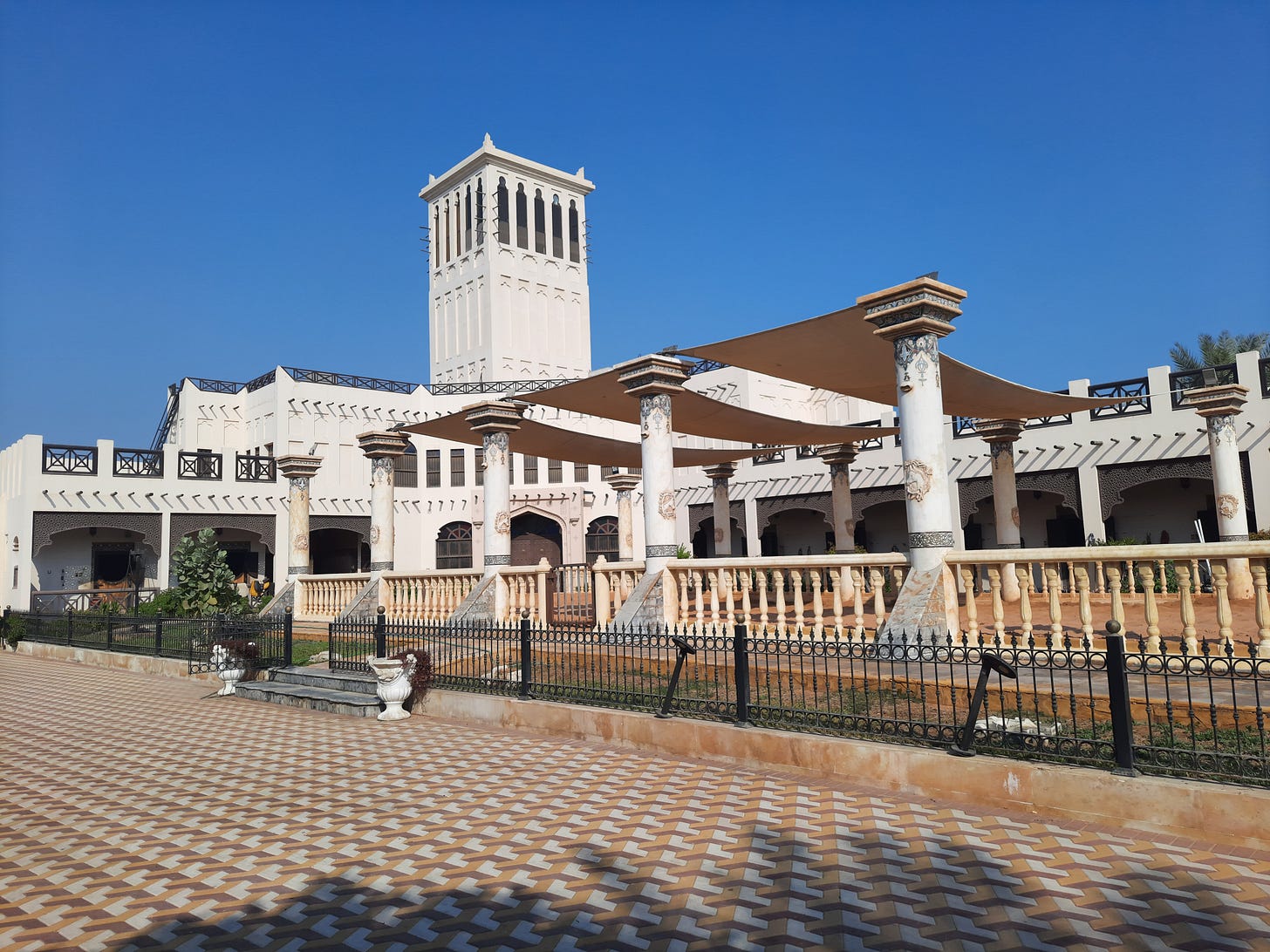Through the land of Alis and Rafeeks [English-International]
Christmas in Saudi Arabia, part co-five (26th December 2024)
In the previous part I’ve described the intensive Christmas Day and its wonderful events. This time around, once again split due to length, I’m gonna take you to a stereotype-breaking visit and a trip full of impressions that were hidden for us in the Eastern Province on the final full day near the Gulf…
Thursday began after the breakfast with a trip a bit to the North - the first point of the voyage was the beach and promenade in the city of Jubail. While on the way there we once again went by the Saudi Aramco site in Dhahran, seeing from the highway that the installations were working intensively. Beside that we stopped by a certain “landmark”, which turned to be a tower of unknown purpose, labelled as cultural heritage object. Despite that, it looked to be poorly maintained, as inside it after passing through a narrow corridor we found only some trash and an unstable ladder leading on top. There we saw only loose soil and unpleasant smell. After checking it all out we got back on the way to Jubail.
We parked near the beach and went right there. It was cool and empty, barring a fishing amateur and the apparatus he had laid out we spotted only a a rapidly departing group of women and few stray cats strolling through the grass. Therefore we took some photos and, discouraged by the cold from swimming, we set off to meet a very unusual man.
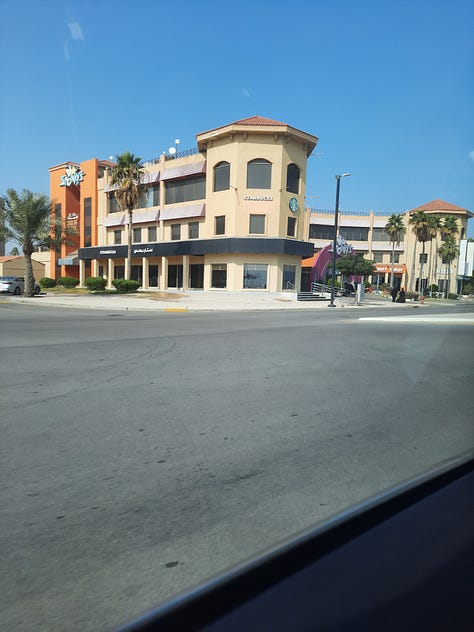

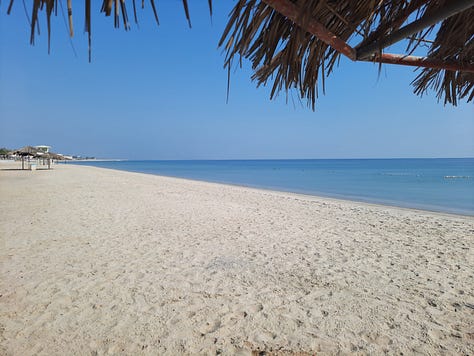
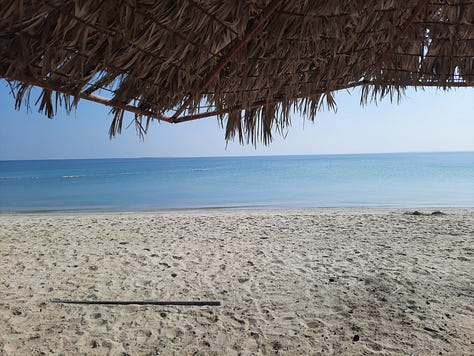
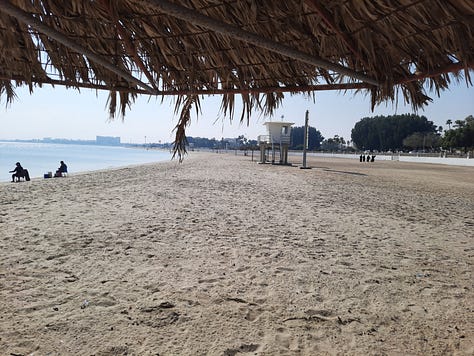
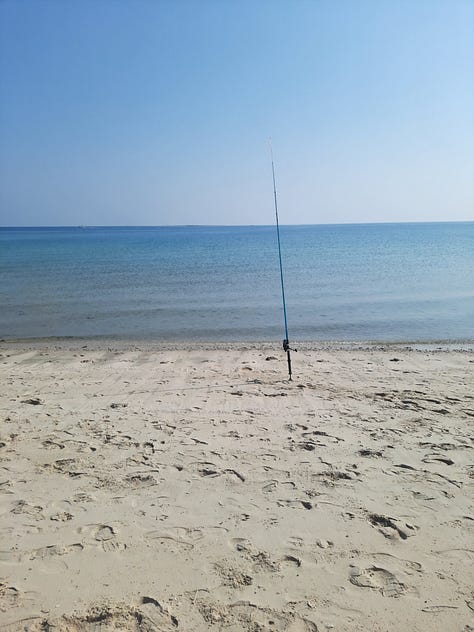
The beach and city in Jubail
Driving through the town we saw many yellow schoolbuses. Although we spotted them yesterday on the streets of Hufuf, their colour pattern seemed even more visible. As Arab Thursday is like Western Friday - the beginning of weekend - the children on their board looked very happy. But we were intrigued on our journey, leaving Jubail and hurrying through the highway and smaller roads to the place of meeting with the mysterious acquaintance of dad’s.
We stopped in front of the entrance gate to a fenced farm, the boundary wall of which looked extremely solid and threatening from the street. Dad called the owner of that residence and told him we were there. In response the gate began to open, and the host on the other end of the phone told us he’s on his way and would arrive soon, inviting us to make ourselves comfortable on the veranda in front of the main house inside. Then he hung up to give instructions to the farm workers, and we, encouraged by the doorman's gesture, went inside.
We stopped in the central part of the complex and got out of the car. What we saw was an extremely well-kept and beautiful house, a palace in fact, which was the heart of a very elegant residence. It looked as shown in the photo below. In front of it was an area for horses, whose stalls made up most of the ground floor of the building. Around it stood empty flower pots in the shapes and forms of, for example, a car, a race car, or a horse-drawn carriage. To the right of the paddock stood a wooden veranda. The roads and sidewalks were paved with visible cobblestones with a mosaic pattern deceptively similar to a three-dimensional sculpture. Opposite were the enclosures of exotic animals - we saw African ostriches and emus, as well as European deer.
While waiting for our host to arrive, we went to the veranda, where we found a small snack prepared, consisting of Arabic coffee and tea, juices in several flavours and sweets. As we feasted on these delicacies, Dad used this time to tell us about the owner of these grounds. On behalf of his retired father, the family estates and their company was managed by his friend. His name was Ali and his firm cooperated with dad’s a couple of times. They’ve established contact via already known to us Rafeek, who was Ali’s senior employee. As it turned out, during the next few hours we were about to learn a lot more on Ali, his family and properties.
For now though we were still awaiting his arrival, and dad gave everyone some advice and warnings. For professional reasons (to avoid suspicions of behind-the-scenes fraternization) we weren't supposed to bring up our relationship with Rafeek. Although he described him as “quite young and open-minded”, Dad taught us to follow local etiquette at the table and in clothing - it was mainly about avoiding using the left hand and wearing longer clothes. I joined my mother in not being impressed with the local customs because of the first reason. Mum commented on the suggestion with the now classic expression "boorishness" that her plain t-shirt and jeans could offend Mr. Arab one with the other, so she just put the sweater on her back. As for me, although my left-handedness had never bothered anyone since kindergarten, I decided not to break local conventions for the sake of this particular meeting (although no one has so far looked at me wrong because of it) and see what people with my condition had to deal with not so long ago.

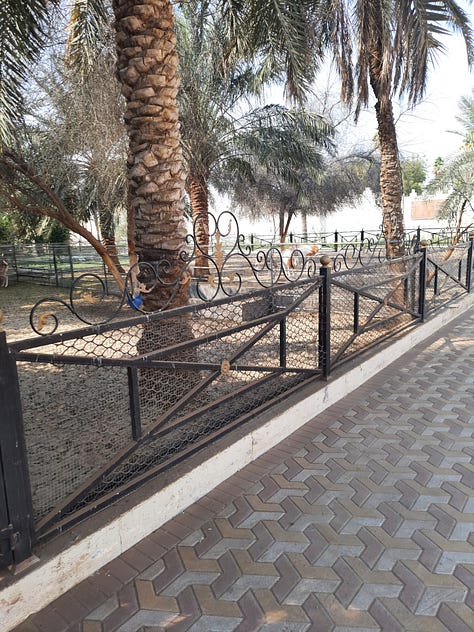
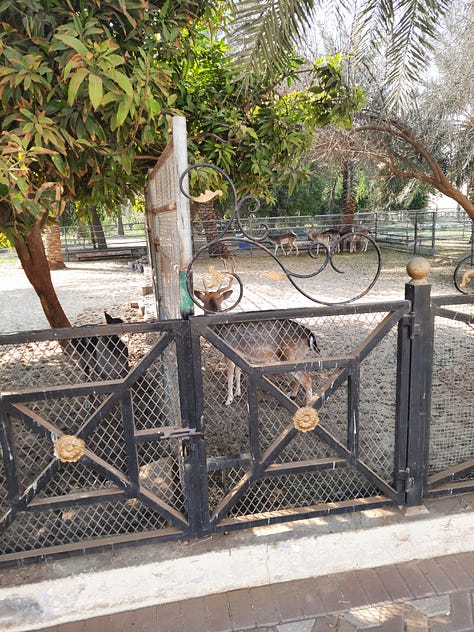
Finally a car pulled up and Rafeek and Ali got out. He was a young man, about thirty years old, wearing a golden Arab winter costume and sunglasses (western), on his feet there were brand shoes. If his clothes didn't give him away, he would seem more French than Arab, also because of his unusual accent. Rafeek on the other hand wore a classic suit. We went to greet them and then everybody came back to the veranda. There everyone could once again taste arabic coffee and tea, after some time the workers brought us also pieces of cake. In the meantime Ali was asking us about impressions from the stay so far. We told him therefore on what made us gasp in awe, focusing on the positives (as there was far more of them). Dad’s friend emphasized his approval of Prince Mohammed's reforms, telling us that a lot of things changed for the better and had we came to Saudi Arabia two years earlier, we wouldn’t recognise the country due to many projects being in progress and under construction. We also learned about his experiences from his European travels, although he has not yet visited Poland.
During the conversation, Ali showed himself to be a man with a truly open mind, not only by local standards. He didn't pay any attention to who was using which hand or how much of one’s body was exposed. He listened to his mother's thoughts with great commitment and willingly answered her questions exhaustively. He was also interested in knowing the opinion of my brothers and mine about the development of our countries, comparisons and explanations of the modern technologies as well as more mundane matters, such as teaching in schools or our relationships with each other. His views reflected that he treated his family and employees with great respect. The only relatively traditional view he shared was the size of a family - he was happy that my parents had three of us, because in his opinion, although smaller families are great, “there shouldn’t be less than three [children per parents]”. Ali himself has only one wife (and they are very happy together), with whom they have three children (his spouse is not willing to have more, and he respects that).
Then we went to see the farm. Ali turned out to be a wonderful guide, telling us interesting stories and eagerly answering our questions. At first we went to the biggest building, consisting of living part and the area with horse stalls. According to the host, his kin lived there for few generations, until his grandfather passed away and his father decided to move away in order to accomodate a huge family. Since then the mansion was set to become the company's showcase and, among other things, the headquarters of another project - horse breeding and riding club. When asked about this by Antek, Ali said that he gave himself a year to make it profitable.
The aforementioned boxes were used regularly, as Ali was a horse lover and collector. Eight horses of different origins and colours lived there, but all well-groomed and of no lesser pedigree. Our “compatriot” was among them - in the first box on the right, Ali introduced us to a mare from one of the Polish stud farms (probably from the infamous Janów Podlaski), who had a name that sounded strange on his lips, which we deciphered after a while as “chojna”. It’s misspelled polish word for “generous”. Mum guessed that the Polish breeder, by spelling her name incorrectly, wanted to make the pronunciation as close as possible to the native word. It seemed to be Ali's favorite mare, and he entered her into beauty and acrobatics competitions several times, in which she earned top prizes.
Then we moved to the animal pens, located to the North from the main house. It was a veritable zoo, containing a multitude of different species, both common on farms and exotic ones. They stood along a paved access road to less formal parts of the farm. The first section had birds, in front of it there was a fish pond. The water was supplied by dolphin-shaped outlets. Ali's birds were both domestic (chickens, ducks, geese) and wild (peacocks, grebes), and even exotic (flamingos, macaws). One of the wild ones almost pooped on us, but we moved out of the way from under the trapeze just in time. Another one had big and small dogs, dangerous (rottweilers) and more friendly (huskies, wolfhounds, mongrels and small dogs). Third, sporadically filled, had stalls for smaller horses, ponies and donkeys, it was also the place where some dogs copulated. Fourth one was home for the goats - as Ali mentioned, her fence had to be additionally secured, the chamois were able to escape several times by jumping over him.
Right after the goats the road turned, coming through the restricted by a gate a wider square. On its further edge stood a hall, in front of which were runs for large (and smaller) farm animals, ending with fenced gates. From left to right there were cows and bulls, yaks and mouflons, musk oxen, more goats and sheep. Some of these animals we could feed with hay and grass from the pile prepared for the evening meal, which we did eagerly. How gracefully they roared when receiving their food! We’ve spent there a longer while, because my parents agreed to also feed little lambs with milk from the bottle, which sparked many memories from the times of their summer holidays at the countryside and helping distant relatives.

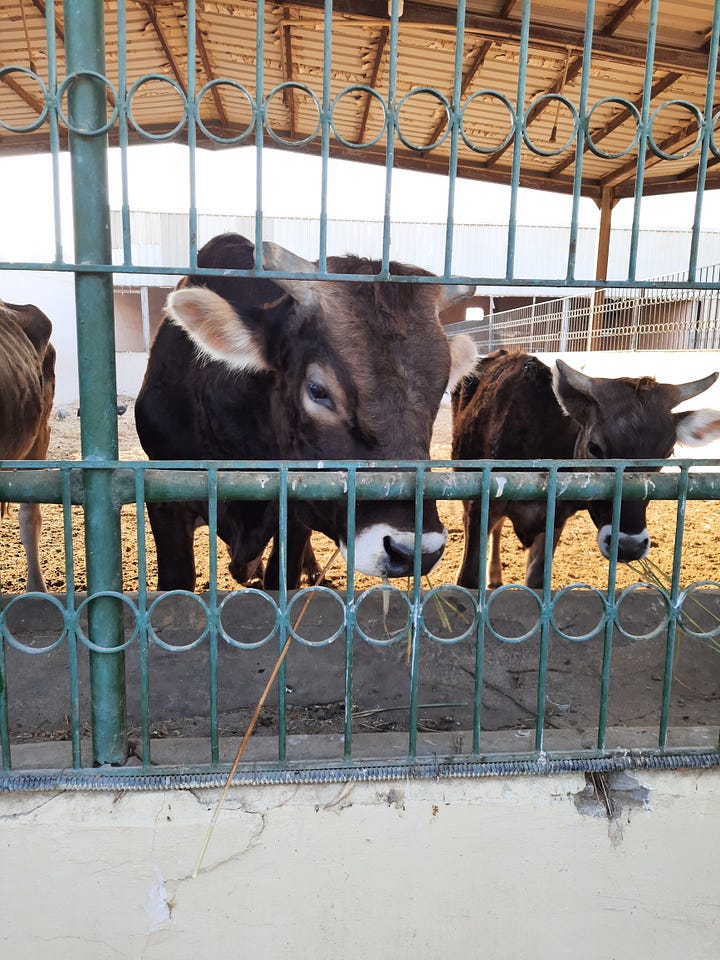
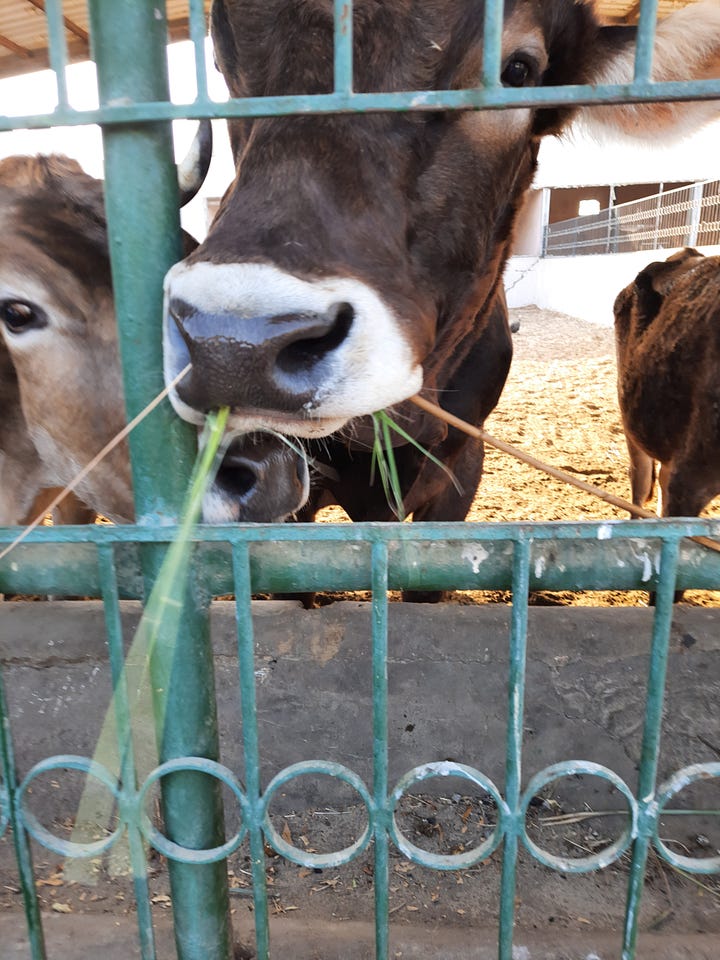
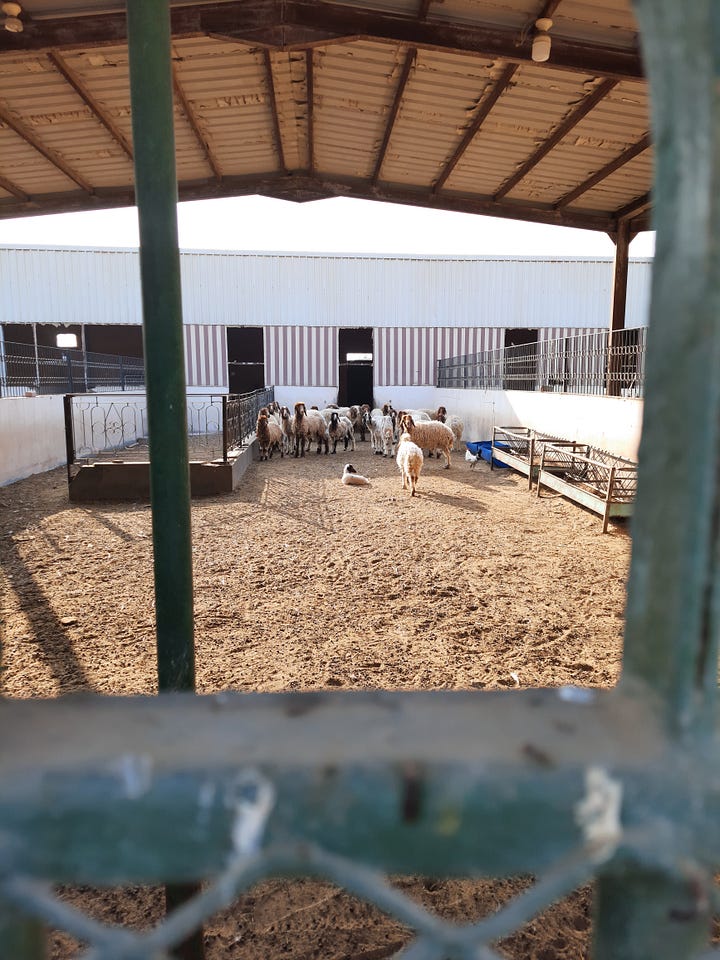
To the East from the animal hall we went to the plant part of the farm. Sunflowers, oranges and lemons bloomed here, as well as a multitude of vegetables and fruits (beans, eggplants) both in the open space and in greenhouses no different from those built in Poland. Everyone was curious about the crops, and Ali talked about them to the best of his knowledge. Once or twice he didn't know what a certain plant was called, but then one of us looked up the name on the internet. Rafeek left us for this part of the walk and returned to the veranda.
Behind the plantations was a hangar and outdoor storage for unused agricultural machines plus an unrestored obstacle course for horses, however we passed by them to reach a viewpoint just behind the farm - cemetery hill of pre-Islamic civilization. It was a mound on a hill, on the top of which were visible pits of empty tombs, the whole thing is marked only with an information board. Theoretically this place was protected as a historic monument, but apart from entering it into the register, entry was possible almost without restrictions. From its top the view spanned for a few kilometers, entire Ali’s estate was visible and he told us that before it was recognised as a historical monument and discovering the cemetery he liked to ride there on a marked path.
We took some photos and returned to the large house, passing on the way nearby a new building with horse stables, where we met younger horses, among them the offspring of “Chojna”. The interior of former family apartment was full of expensively decorated furniture, objects and paintings, also also equipped with a western-style toilet and elevator to the top of the tower. But it was a narrow lift - only up to three people standing close to each other could use it at once. So we went to the top in two rounds, from where we again admired the view of the entire area and cigar collection of Ali’s grandpa.
The sun began to sink over the horizon and the time to part slowly approached. We walked back to the veranda, where we spend some more time on chattering while waiting for the arrival of Ali’s younger brother, Abdulaziz, who was going to give us the tour of the mansion’s garage. Despite Ali’s description of him as more conservative than himself, it wasn’t present in his stance. Abdulaziz turned out to be a fan of motor racing, especially Formula 1, which I talked about with him. He was very excited to meet another fan and spoke to me passionately about his favourite teams and drivers. After a moment of chatter he invited us to the garage, where he stored in expectation of finding professional car renovators few “gems”. There was a Bugatti race car in yellow livery, dating for 1st half of the 20th century, a sports MP convertible, a turn-of-the-century Mercedes and a white vintage Chrysler. Additionally, in the corner there was a black horse-drawn carriage, several unused bicycles, and a children's BMW toy car. Not all of these machines ran or could even start the engine, but they definitely had the potential for restoration.
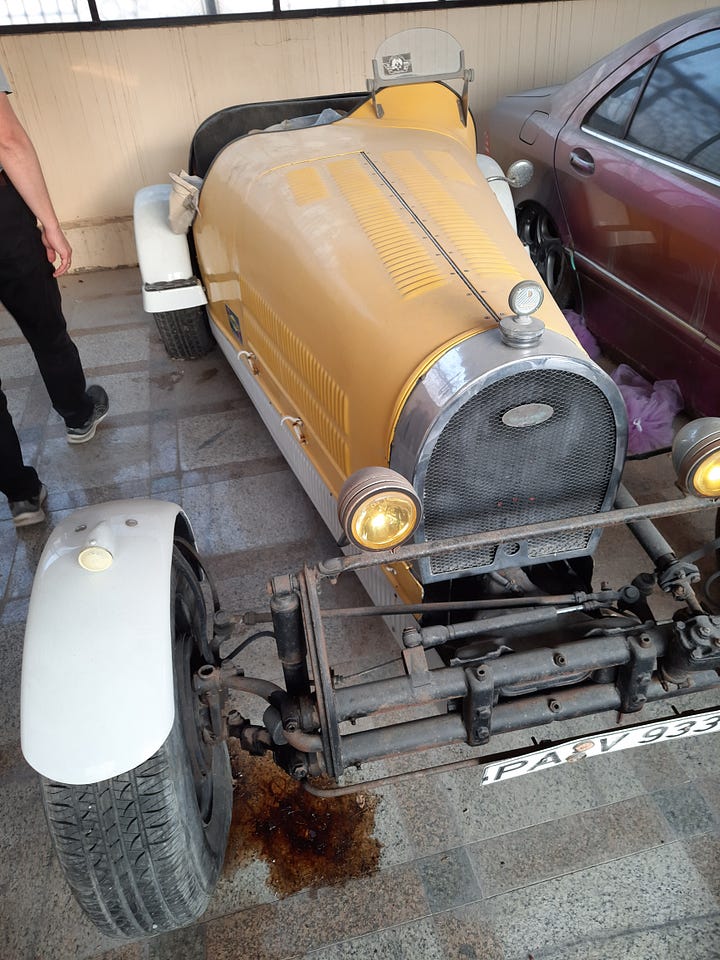
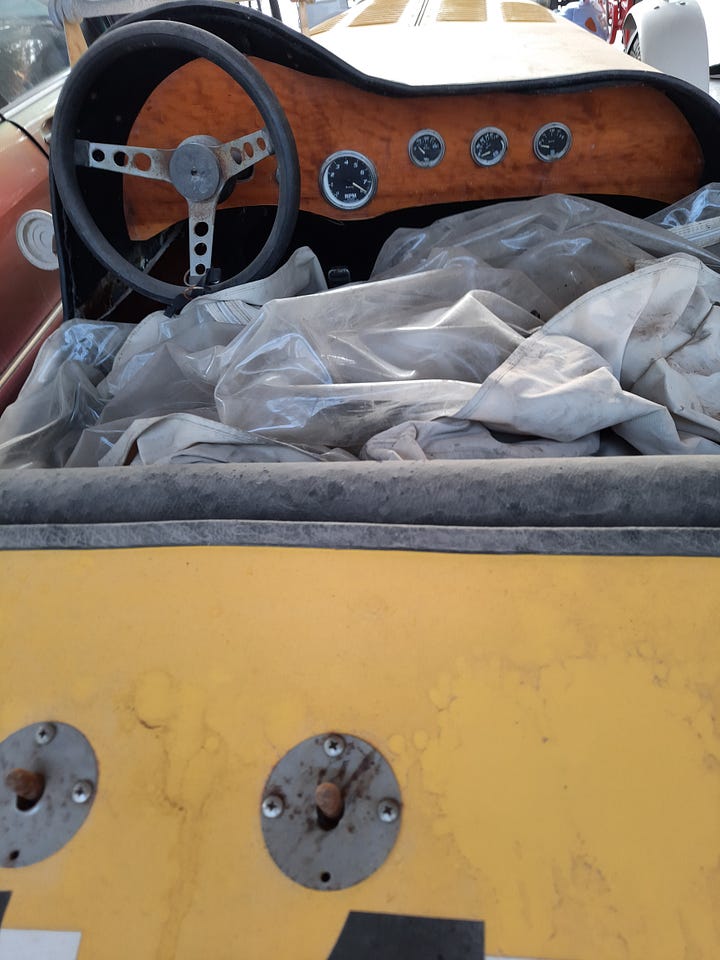
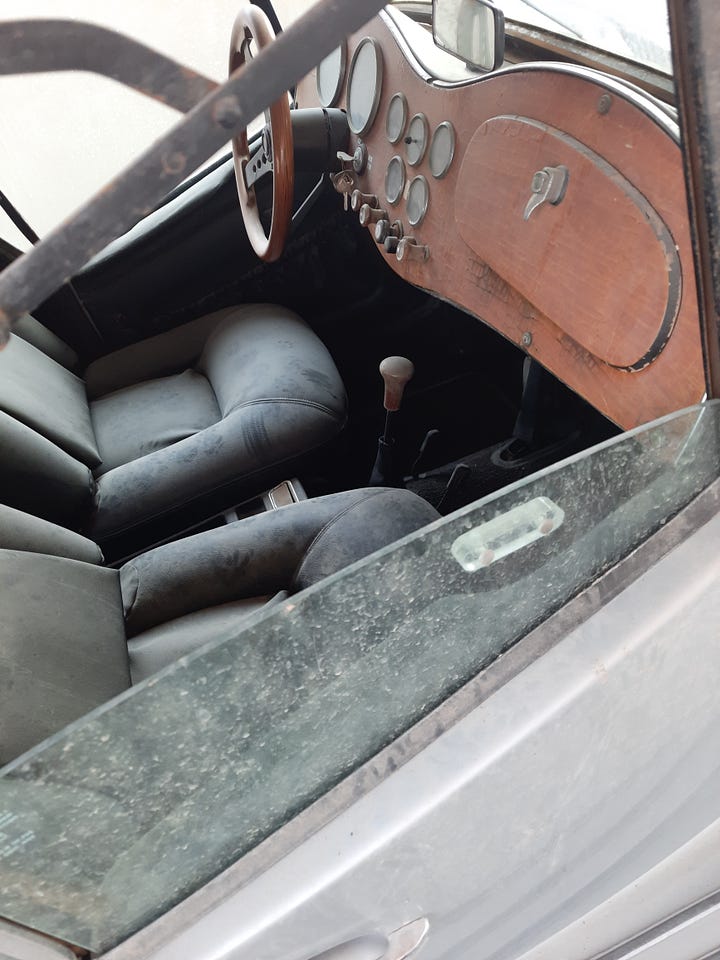
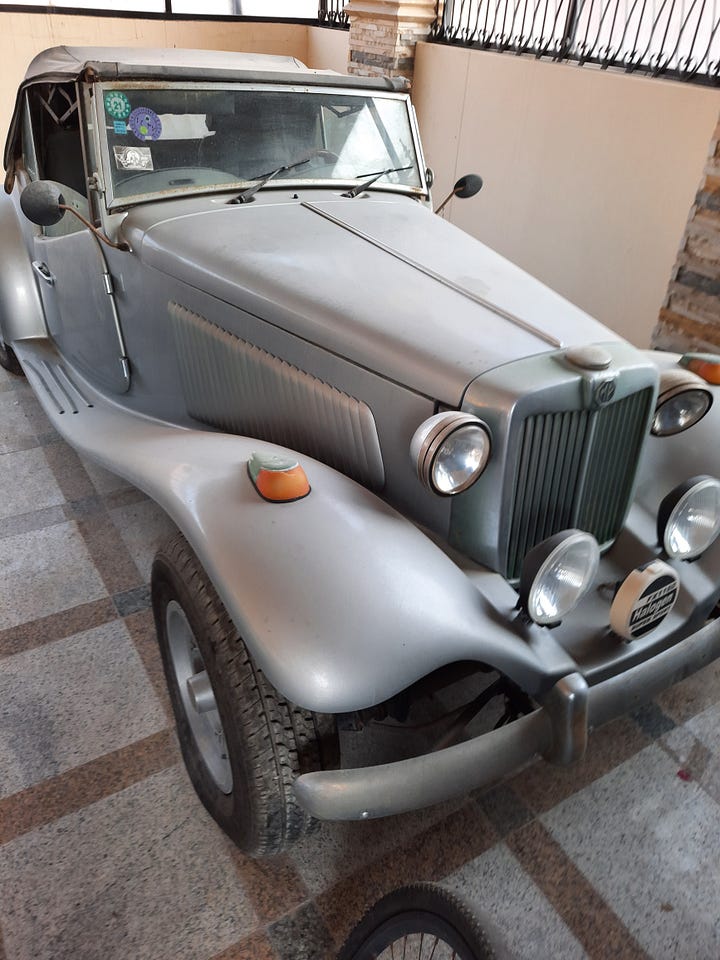
After seeing the entirety of the garage’s content we bid farewell, having previously invited Ali and his family to Poland. In the rays of the setting sun we departed the property and its very nice host, sharing thoughts and mind associations of this place with a hybrid of a mini zoo and an agritourism farm or open-air museum, like those we visited many times during family and school trips. Satisfied, but a little tired, we went to the Indian restaurant Grill Garden for dinner, located a short distance towards Dammam, which walls were covered with humorous explanations of culinary terms.
Past the dinner we got on our way for an evening walk on the Tarout/Tarut island, located vis-a-vis the city of Ras Tanurah. There we strolled pass the historical buildings, over which towered the castle, expanded by the Portuguese in colonial times. Because of the late time and the beginning of local weekend we couldn’t do sightseeing there. The situation was similar with the museum found in the city. So we wandered around the area for a bit, laughed at the absurdity of a telephone receiver sticking out of the bare wall of one building and looked at the decorations of home gardens.
The drive to the final part of the day programme was suddenly delayed - the car needed an instant oil change. The appearance of this light couldn't have happened at a less fortunate moment, at the threshold of the weekend and the beginning of the night, and moreover somewhat on the route. Antek and Ignac definitely didn't improve the mood, as for the entirety of the journey so far they quarrelled about whose time it was to sit in the middle seat. In their dispute they brought up wrongs that dated back to their earliest memories, at times even tracing to the “legendary” times from before the other’s birth. Furthermore, they were pushing and blocking each other from getting into the car all day long, which delayed the departures and really got on the nerves of the others, especially Dad. The situation reached its boiling point when we made it to a “servo” (I feel this Australian word describes best the gas stations with car services and shops in close proximity to it, but more on that in another post) where the oil was to be changed. Feeling that dad could be tempted by Jos Verstappen’s parenting methods (described in my comment under here)1, I took my brothers on a side and sacrificing my own comfort I negotiated a schedule for the rest of the trip for sitting there. In the meantime the car was fuelled up and the polite and positive mechanics from the service quickly dealt with the defect and changed the oil.
At last we could get to the final “attraction”, that being the coffee in the shop/bar of Ali. But it was only a namesake of the one from the farm. The other was self-made entrepreneur who set up two caffes in Dammam and neighbourhoods, serving coffee imported from many corners of the world, such as Uganda, Brazil and El Salvador. As he was on business in another part of the country, we did not find him at the café, but we stopped for coffee, opting for African beans. In the oriental manner we drank in peace, enjoying the infusion and admiring the decor of the place which consisted of bags and packages, old coffee machines and theme paintings. Upon leaving dad texted the “second Ali” to tell him we enjoyed his products very much, as we indeed had.
Before returning to the hotel we drove to a shop where dad bought his and Ignac’s traditional Arab veils, because I wanted to have a local outfir for souvenir. Unfortunately there was none in my size. But we were able to buy a little further down the road the dates for the entire large-family. At last, after all this we came back to the hotel in late evening and went to sleep. We weren’t tight on schedule, though, as Friday was supposed to be a more relaxed day.
But that will be in the next part. See you then.
Max
Not having any particular personal story in mind, I'm gonna just settle on the bad joke from the world of Formula 1 racing: Sometimes, as Jos Verstappen would tell you, being left behind at a gas station is a pivotal part of upbringing a multiple world champion! 😉
Context: that's what former F1 driver Jos Verstappen deliberately did to his son Max when the latter lost a chance to win in karting after crashing with another driver, which led the duo to argue on their way back home. The currently-triple [now quadruple] world champion had been later picked up by his mother, who was a bit behind them in another vehicle, and his dad didn't speak to him for a week.




